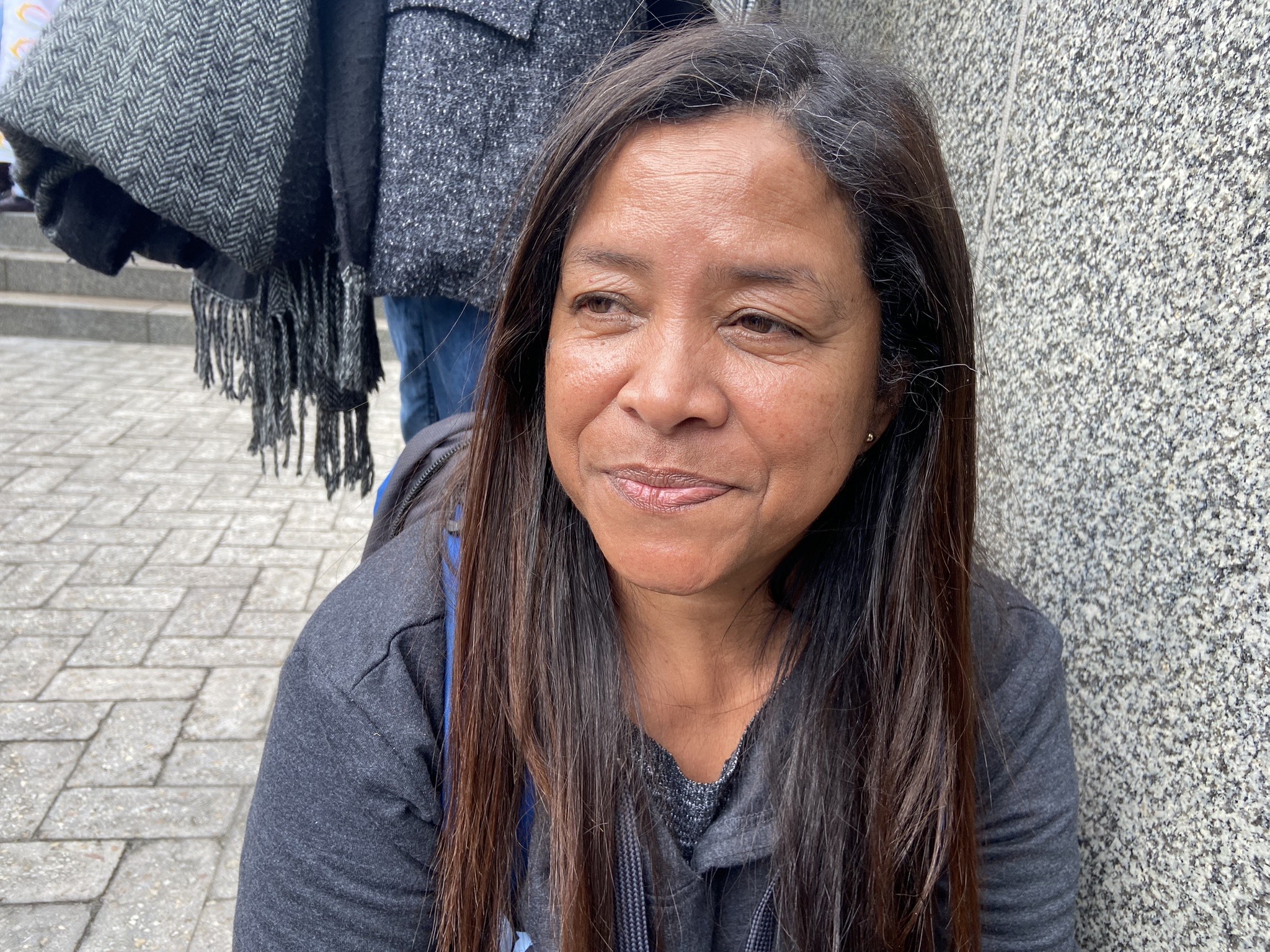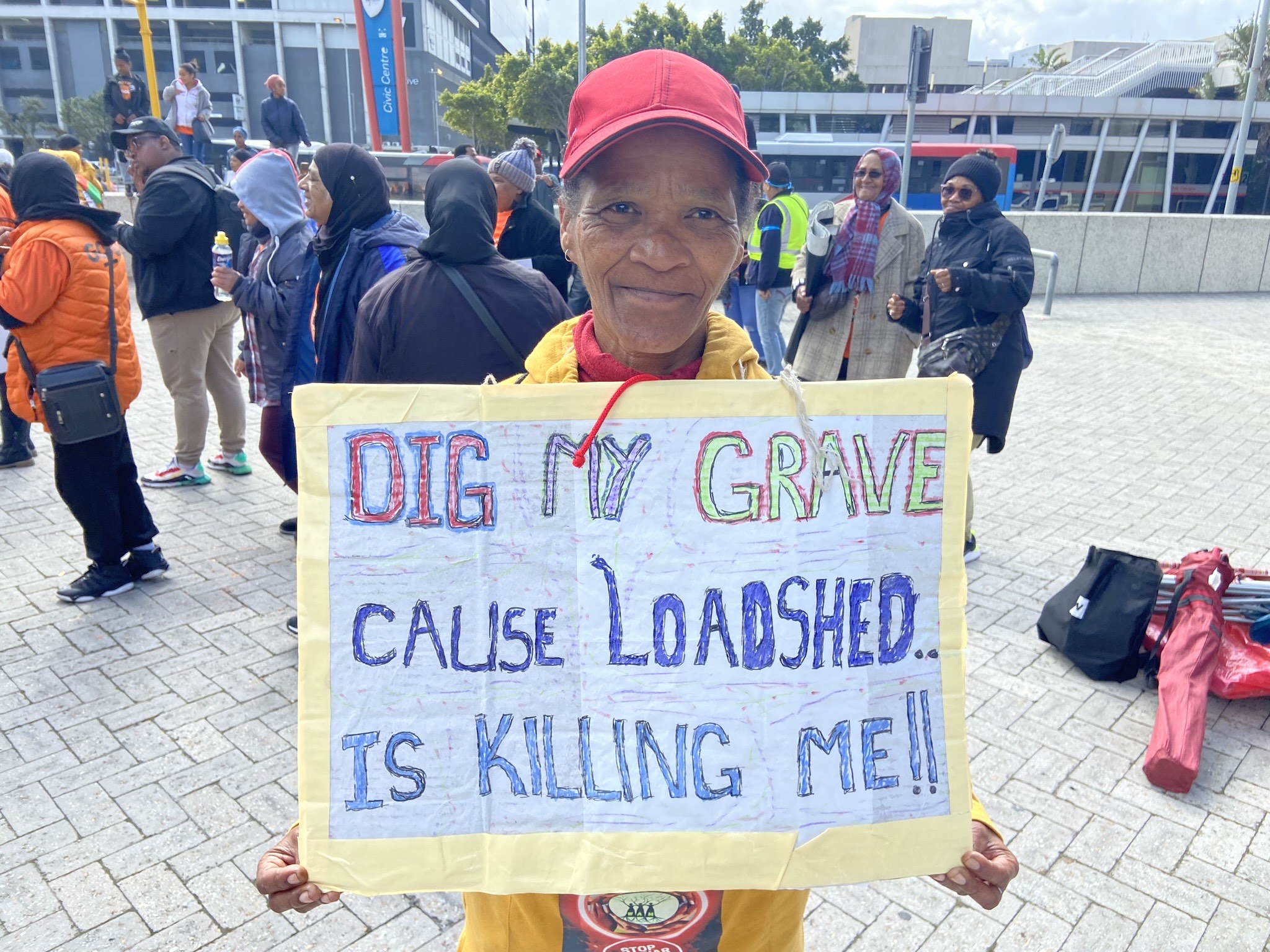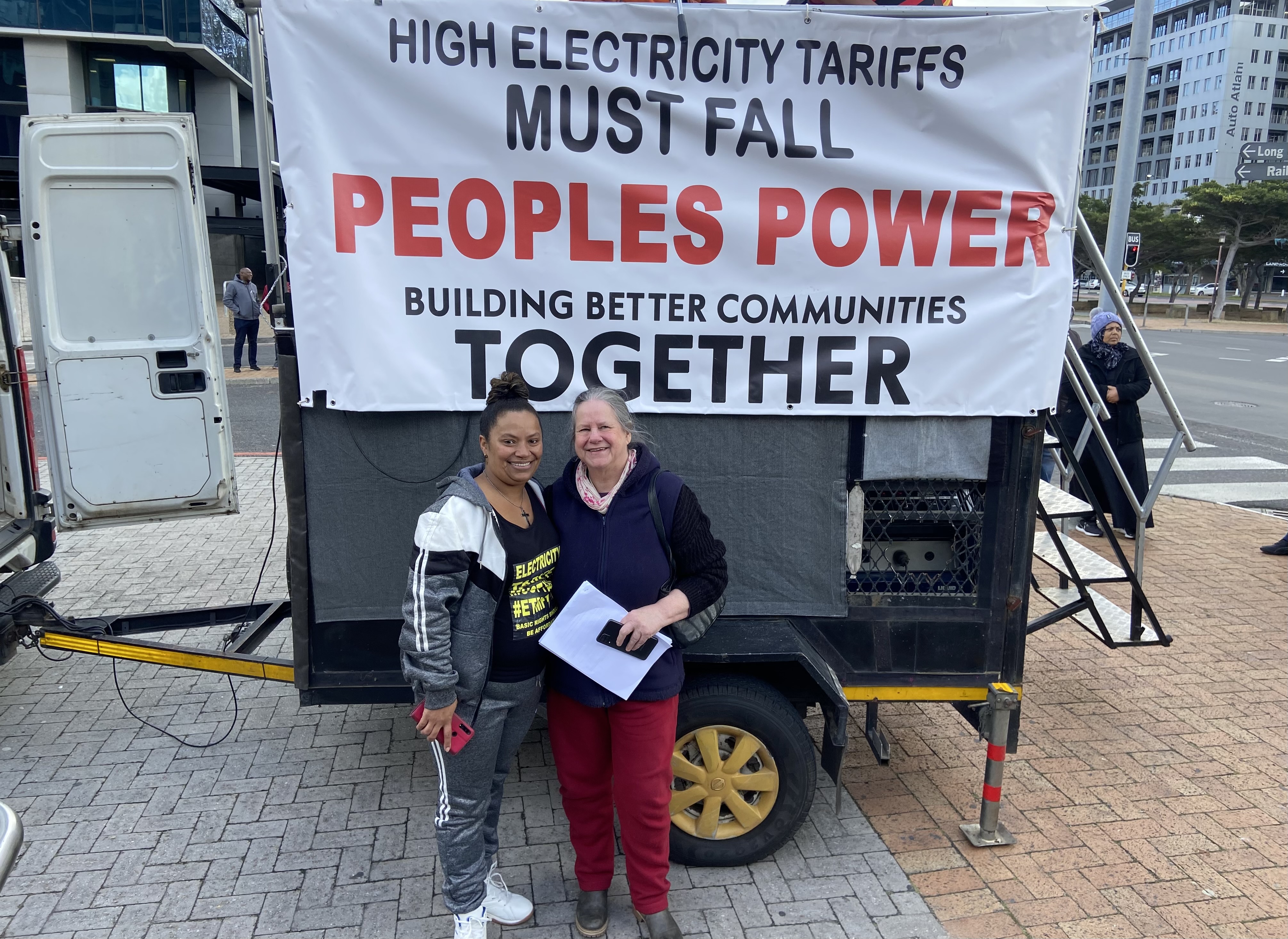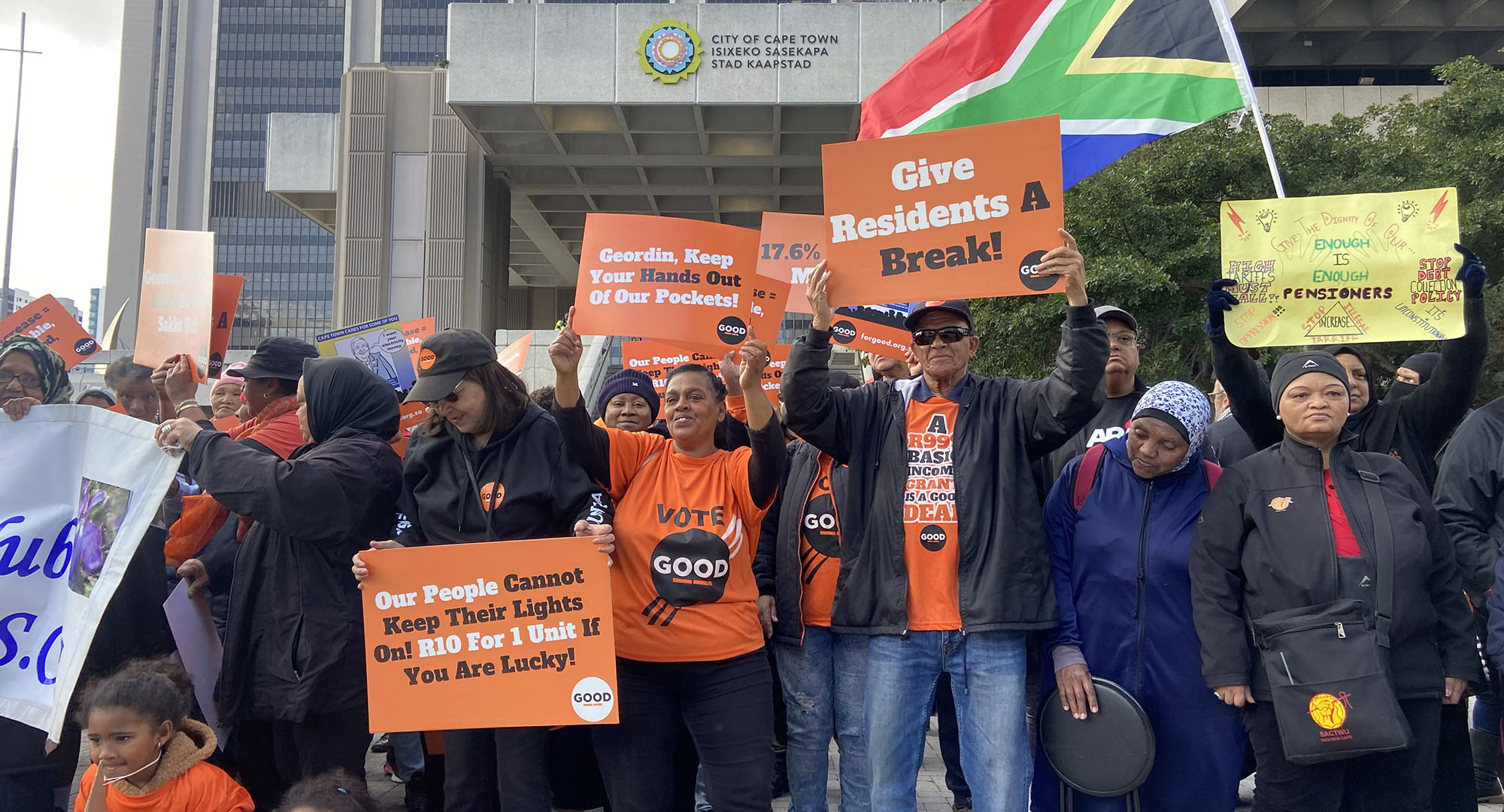Cape Town residents took to the streets on Saturday, 26 August, to protest against the City of Cape Town’s 17.6% electricity tariff increase, which came into effect on 1 July.
Following the implementation of the electricity tariff hike, numerous residents lodged complaints with the city.
More than 100 residents gathered at the Civic Centre on Saturday to hand in a memorandum to the officials from the Mayor’s office.
The primary objective of the protest was to deliver the memorandum and get the city to cut its 2.5% percentage point hike in line with the National Energy Regulator of South Africa Nersa’s (Nersa’s) 15.1% requirement.
The memorandum consisted of 15 demands. These included:
- Amend the 17.6% it added to electricity tariffs on 1 July 2023 to the correct Nersa figure of 15.1%;
- Remove the 37.6 cents added to each unit bought and cease subsidising the rates department by taking 10% from electricity revenue;
- Remove electricity block tariffs and link to property values;
- Automatically give pensioners rebates which must include free units similar to those given to the indigent; and
- Stop prepaid deductions after an arrangement was made.
The protest was organised by #STOP COCT and Electricity Tariffs Must Fall and attended by more than 20 lobby groups.
Anger and dissatisfaction in the city over municipal bills have been growing. As part of their complaints, residents demanded that the City’s debt collection policies be immediately changed and the exorbitant tariffs be scrapped.
 Zerina Calvert (53), a single mother from Grassy Park, says she struggles to make ends meet on her minimal salary. (Photo: Samane Jnr Marks)
Zerina Calvert (53), a single mother from Grassy Park, says she struggles to make ends meet on her minimal salary. (Photo: Samane Jnr Marks)
‘Build in the community, not exploit them’ – Zerina Calvert
Zerina Calvert, a 53-year-old single mother from Grassy Park, said she struggles to make ends meet with the minimal salary she currently earns.
“This tariff increase affects me directly because already, I cannot make ends meet with the little salary that I receive. I cannot afford enough food and now it’s the increase of electricity tariffs,” she said.
“The City of Cape Town needs to understand it is a municipality; they’re not here to make profits, they need to help and build in the community, not exploit them.”
 Francina Dejong, a West Bank resident who receives a monthly disability grant monthly, says the tariff increase is unaffordable. (Photo: Samane Jnr Marks)
Francina Dejong, a West Bank resident who receives a monthly disability grant monthly, says the tariff increase is unaffordable. (Photo: Samane Jnr Marks)
‘Disability grant is insufficient’ – Francina Dejong
Since the City’s increased power rates over Nersa’s cap of 15.1%, it has been a struggle for Francina Dejong, a recipient of a disability grant living in the West Bank area.
“It gets worse sometimes since I have to make my two kids sugar water when they get home from school so they can at least have something to drink and eat. My disability payment is insufficient because we use it for other household needs,” Dejong explained.
“For many of us, this increase in electricity has dug graves. Living is challenging. Despite being a woman, I am now required to obtain wood at the bush every day. I live in worry that I won’t make it back, and I don’t know whether I will.”
Trade union federation Cosatu in the Western Cape also joined the protest. Cosatu’s provincial secretary Malvern de Bruyn said the City’s cruel decision to raise electricity rates by a massive 17.6% was an insult.
He told the crowd that the mayor wasn’t paying attention to their complaints, and that this was an insult and a direct disrespect to the people’s grievances. “We want the mayor,” he shouted, as the audience applauded him and began shouting, “We want the mayor, we want the mayor, we want the mayor.”
Read more in Daily Maverick: Fuming walkout – eThekwini rates boycott rolls on after disastrous meeting with mayor
 Natasha Gertze, left, and Sandra Dickson organised the civic protest in Cape Town, which brought together community members to fight against the increase in electricity tariffs. (Photo: Samane Jnr Marks)
Natasha Gertze, left, and Sandra Dickson organised the civic protest in Cape Town, which brought together community members to fight against the increase in electricity tariffs. (Photo: Samane Jnr Marks)
‘Enough should have been enough’
Natasha Gertze, founder of Electricity Tariffs Must Fall, told Daily Maverick that they came to remind the city that residents’ voices matter.
“Enough should have been enough a long time ago; we came out today to take our voice back. Electricity is an everyday need for us as citizens. Debt collection via electricity units must fall,” Gertse said.
She added that the increase has caused them financial hardship, particularly for the poor and retirees in their respective communities as many are unable to cover the new rate hike.
According to the City’s mayoral committee member for energy, Beverley van Reenen, the City has been in contact with Nersa, in terms of the Electricity Regulation Act.
“Nersa must allow an efficient utility to recover its costs, but it has not made a rational, lawful decision on the City’s application for 17.6%, driven by the 18.5% Eskom increase.
“The City awaits sight of Nersa’s new legally compliant method for recommending municipal tariff increases, which the courts have ordered to be in place by later this year,” Van Reenen explained. DM




 Natasha Gertse, left, and Sandra Dickson are the organisers of the civic protest in Cape Town, which brought together community members to fight against increases in electricity. (Photo: Samane Jnr Marks)
Natasha Gertse, left, and Sandra Dickson are the organisers of the civic protest in Cape Town, which brought together community members to fight against increases in electricity. (Photo: Samane Jnr Marks)